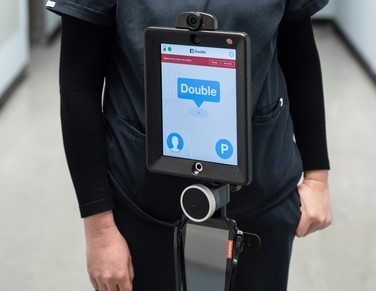
Quintin the robot, who has been assisting physicians at Tygerberg Hospital’s Covid-19 intensive care unit (ICU), is now also helping to put concerned family members in touch with ICU patients that have had to be isolated – and in some cases, allowing them to say goodbye for the very last time.
Quintin, a Double Robotics robot that looks like a computer tablet on wheels, has been equipped to do video and voice calls using the freely available WhatsApp service, or regular phone calls. That means family members can now dial in to “visit” with patients in the Covid-19 ICU.
Quintin can be remotely steered using an app and therefore hospital staff don’t have to physically enter the ward to position the robot. This reduces their risk of infection, saves on personal protective equipment (PPE) and frees up their time to focus on other tasks.
Enabling contact between patients and their families has been a “humanising process”, explains Dr Kerry Louw, a psychiatrist at Stellenbosch University’s Faculty of Medicine and Health Sciences (FMHS) and Tygerberg Hospital.
She likens the experience of being a patient in an ICU to “a form of psychological anguish which involves a fear of death, unexpected pain and sensory deprivation, as well as overstimulation”.
“ICU patients are not only physically ill, but often also suffer psychologically because they are isolated from their families, are sleep-deprived due to the constant beeping of machines, and experience no natural light or air movement. Some patients stay in an ICU for long periods of time, and it becomes really difficult for them,” Louw explains.
Louw says the Department of Psychiatry was already providing individual and group support for healthcare staff working with Covid-19 patients, when a colleague asked if they could help with patient family contact. When Quintin is called upon to assist, he moves over to the patient and sometimes stays with them for hours while the family visits virtually.
According to Prof Coenie Koegelenberg, an FMHS pulmonologist who also works in Tygerberg Hospital’s Covid-19 ICU, the idea of using Quintin in this capacity came about “because we didn’t expect the patients to be so aware, awake and anxious.”
“It is difficult for healthcare workers to provide psychological support through a mask and goggles, because you look like an alien and it is difficult to hear what people are saying,” he says.
None of the ICU specialists have fallen ill yet, but Quintin’s services as an intermediary between patients and their families have been indispensable.

